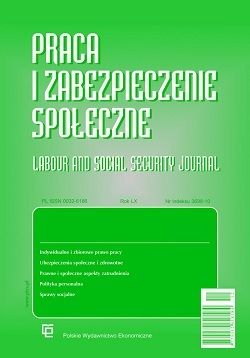
- Contractual ban on additional employment after the amendment to the Labor Code
The admissibility of a contractual prohibition or other limitation on the performance of additional employment by an employee, which is not competitive with the employer, requires reconsideration after the amendment of the Labor Code introduced by the Act of March 9, 2023 amending the Act - Labor Code and amending certain other acts (Journal of Laws item 641), preceded by the entry into force of Directive (EU) 2019/1152 of the European Parliament and of the Council of 20 June 2019 on transparent and predictable working conditions in the European Union (OJ L 186, p. 105) Content of the new introduced provision of Art. 261 of the Labor Code does not lead to clear conclusions, which makes it necessary to resort to non-linguistic methods of interpretation. In the light of its results, the legislator excluded the parties' competence to conclude an agreement prohibiting additional employment, which, in the author's opinion, constitutes an excessive limitation of the freedom to shape the content of the employment relationship.
- Dismissal from work due to force majeure
The provisions added to the Labor Code as a result of this year's amendment include a regulation regarding dismissal from work due to force majeure. The author analyzes this regulation, focusing in particular on the premises and principles of granting this exemption, as well as its scope. It also indicates the legislator's errors that may affect the application of the new provision. - Not all parental rights for police officers
The amendment of March 9, 2023 to the Labor Code and certain other acts (Journal of Laws of 2023, item 641) introduced significant changes in the scope of parental rights not only in relation to employees, but also to uniformed services officers and professional soldiers . The article analyzes new regulations regarding the parental rights of police officers. Not all parental rights available to employees apply to police officers. The Police Act expressly excludes the possibility of using the institution of reduced service time during the period when a police officer is entitled to grant him parental leave (Article 1867 of the Code of Labor) and to apply for flexible organization of service (Article 1881 of the Code of Criminal Procedure). In addition, there are restrictions resulting from other provisions of the Police Act, which affect the possibility of applying some regulations of the Labor Code in the scope of parental rights, e.g. simultaneous use of parental leave by parents. - Assessment of occupational risk at a remote work position in the light of changes to the Labor Code
The article presents the issues of regulations regarding the assessment of occupational risk during remote work and occasional remote work in connection with the amendment to the Labor Code. The study presents theoretical and practical aspects of hazard identification and occupational risk assessment related to remote work. - Protection rights available to Ukrainian citizens residing in Poland after February 24, 2022 (part II)
The second part of the article is devoted to the analysis of specific normative solutions that have recently been introduced in the Polish legal system in order for the Polish authorities to provide social support to war refugees from the territory of Ukraine. - The procedure for withdrawing the A1 certificate and the retroactive inclusion of a posted employee in the social security system of the country where work is performed
The jurisprudence of the Supreme Court states that the withdrawal of the A1 certificate by ZUS must be preceded by an agreement with the institution of the place of work to be subject to the relevant legislation retrospectively. In this context, the study discusses the procedure for withdrawing the A1 certificate, as well as the issue of agreeing on the applicable legislation by the interested institutions and retroactively including the posted employee for whom the A1 certificate was withdrawn into the relevant system. Against this background, the problem of protecting a posted employee against the effects of retrospective verification of legislation in the absence of discrepancies as to the applicable legislation and, consequently, the lack of need to conclude an appropriate agreement will also be presented. - Is it necessary to institutionalize the profession of psychotherapist?
The considerations presented in the article concern the regulation of the psychotherapist profession. This issue was analyzed primarily in order to determine the legal status of the indicated profession de lege lata. The findings confirmed that there are no regulations in this area. The result was an attempt to assess whether this profession could potentially meet the determinants of a free profession, as well as how this profession differs from the professions of a psychiatrist and a psychologist. The author also analyzes the issue of freedom to choose and pursue a profession, as well as legal possibilities of limiting this freedom - assessing the regulation presented in the content. The article also describes an empirical study, which shows that the vast majority of people practicing the profession of psychotherapist and participating in the study gave a positive answer to the question whether Polish psychotherapists need legal regulation of this profession. As a result of the analysis, the need to institutionalize the profession of psychotherapist was supported and de lege ferenda conclusions were formulated regarding the potential course of action of the legislator and areas that should be taken into account when developing an act regulating the functioning of this profession. - "Start-up relief" (Article 18(1) of the Entrepreneurs' Rights) - rules of compliance
The study discusses the position of the Supreme Court, which is important for practice, regarding exemption from compulsory social insurance for a period of 6 months from the date of starting a business activity. The Supreme Court clarified the rules for calculating the 60-month period referred to in Art. 18 section 1 The rights of entrepreneurs, the so-called "startup relief".
Praca i Zabezpieczenie Społeczne (Work and Social Security) - the whole list






